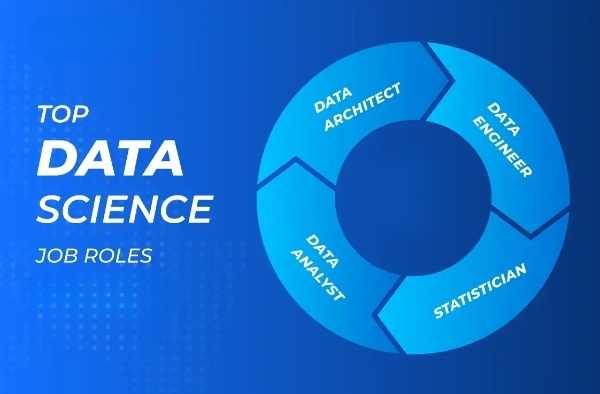university.nakul@gmail.com | Posted on
Data science is becoming a very popular career among many, due to the huge amount of data and the need for organizations to get useful information from it. With companies in many industries relying more and more on data-driven decisions, the need for data science professionals is growing. Data science offers many career paths, each with different responsibilities, needed skills, and making a difference. In the next section, we will discuss the main data science careers, describing their responsibilities, needed skills, and importance in the data-reliant world today.

1. Data Scientist
The job of a data scientist is very significant in data science. Data scientists are good interpreters. They apply statistical techniques, machine learning, and programming to identify patterns and insights in structured and unstructured data. Their primary responsibility is to solve challenging business questions by developing models that predict outcomes, discovering insights in data, and presenting results in a format that decision-makers can take action on. A data scientist will typically work with software such as Python, R, SQL, and machine learning libraries such as TensorFlow or Scikit-learn. Besides being technically proficient, they also require good communication skills in order to enable the bridging of data and decision-makers. The profession is still in demand because it is multi-faceted and has a direct influence on major decisions.
2. Data Analyst
Data analysts are generally classified alongside data scientists, but their primary role is to comprehend existing data as opposed to creating predictive models. Their role is to gather, clean, and analyze data to create reports and dashboards to inform business decisions. Data analysts are proficient in software such as Excel, Tableau, Power BI, and SQL, and are proficient at taking raw data and making it actionable information. They might seek out trends, discover issues, or confirm key performance indicators (KPIs) in a company. While this role is generally considered more entry-level than that of a data scientist, it is a step in a data science career and is important to keeping operations humming.
3. Machine Learning Engineer
Machine learning engineers are individuals with knowledge of developing, crafting, and putting into action machine learning models in products of value. They convert data scientists' lab work, including the development of algorithms, into products that are actionable and scalable. This entails good proficiency with software engineering disciplines and hands-on expertise in machine learning toolboxes such as PyTorch, Keras, or Spark MLlib. Machine learning engineers typically collaborate with data scientists and software developers to ensure models operate at the best possible performance as well as compatibility with systems currently operational. With greater deployment of AI technology, the value of this profession has grown exponentially in sectors of healthcare, finance, as well as autonomous systems.
4. Data Engineer
Data engineers are the builders of the data pipeline, making data accessible, consistent, and ready to be analyzed. They create, build, and manage the infrastructure that enables data to move from its sources to databases or data warehouses. Unlike data scientists or analysts, they are less concerned with analysis and more concerned with building reliable systems using libraries like Hadoop, Apache Kafka, Spark, and cloud providers like AWS or Google Cloud. Data engineers must be skilled in programming (like Python, Java, or Scala) and database administration. Their efforts are preparatory in nature, allowing other data professionals to carry out their work successfully.
5. Business Intelligence (BI) Analyst
Business intelligence analysts care about the process of converting information into insights for informing business strategy. They leverage historical information to generate reports, forecasts, and visualizations that allow organizations to see into their performance and the position of their market. BI analysts often make use of software like Tableau, Looker, or QlikView and have a sound grasp of principles of data warehousing. Their work, although somewhat similar to that of a data analyst, is more interested in strategic impact, like identifying opportunities for expansion or process efficiencies. This role is particularly important in retail, finance, and marketing sectors where knowledge of what has happened previously is required in order to plan for the future.
6. AI Research Scientist
AI research scientists play a core position at the forefront of data science with specialization in advancing the field through new developments in machine learning and artificial intelligence. The position is mostly academic and research-oriented, often demanding a PhD or higher degree in a related discipline. AI research scientists develop new algorithms, refine model precision, and tackle issues like natural language processing (NLP) and computer vision. AI research scientists are employed in environments like large tech firms (e.g., Google, Microsoft) or research institutes, making key contributions that will shape the future of artificial intelligence. Mathematical and statistical knowledge, along with programming skills, is crucial, along with fervent passion for pushing the frontiers of knowledge.
7. Data Architect
Data architects are responsible for designing the framework of an organization's data management systems. They make sure that these data systems are scalable, secure, and aligned with business objectives. The role entails specifying how data is stored, integrated, and retrieved on various platforms, frequently collaborating with cloud platforms such as Azure or Snowflake. Data architects collaborate with data engineers and IT teams to establish efficient frameworks supporting analytics and reporting. Their technical expertise and strategic thinking render them extremely useful in big organizations that handle vast amounts of data.
Conclusion
Data science has a range of career opportunities, and each is associated with different capabilities and interests. Data scientists and analysts exhibit keen analytical skill, while data engineers and machine learning experts have engineering inclination. These careers drive the data revolution forward. As companies become more significant in using data, those with these careers will have high demand, helping companies and solving real problems. Either one likes writing useful code, making strategic suggestions, or conducting innovative research, there is a data science role that suits their skills and goals.
0
0 Comment
